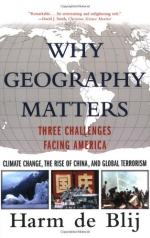
|
| Name: _________________________ | Period: ___________________ |
This test consists of 5 multiple choice questions, 5 short answer questions, and 10 short essay questions.
Multiple Choice Questions
1. Why is geography different from other disciplines, according to de Blij?
(a) It makes unexpected links between topics.
(b) It is constantly changing.
(c) It is always in the news.
(d) It covers science and technology.
2. Which of the following maps can you derive the most accurate estimates of distances from?
(a) A map of the United States.
(b) A map of the world.
(c) A map of a city block.
(d) A map of a city.
3. What two countries were mixed up by President Nixon's staff?
(a) Brazil and Bolivia.
(b) The Congo and Cuba.
(c) India and Indonesia.
(d) Mauritania and Mauritius.
4. Which of the following maps has the smallest scale?
(a) A map of the United States.
(b) A map of a city.
(c) A map of the world.
(d) A map of a city block.
5. Why does de Blij feel that Americans are unprepared to evaluate global warming?
(a) Because they do not take classes in geography.
(b) Because they do not know enough about science.
(c) Because they do not understand geologic history.
(d) Because they do not pay attention to current events.
Short Answer Questions
1. Which of the following countries adds nine or ten million people to the world's population every year?
2. Why did life expectancy in Botswana fall from 60 to 39 between 1994 and 2004?
3. When did China first begin to feel the impact of the Little Ice Age?
4. What did Gilbert Grosvenor , the grandson of the National Geographic Society's 1950 president, do to improve geographic literacy in the United States?
5. What technological development revolutionized cartography?
Short Essay Questions
1. What was the world like when the nation-state was emerging?
2. How does de Blij feel that U.S. power is changing with regard to China and India?
3. What caused the "year without a summer"?
4. Why should Americans care about worldwide population growth?
5. How has the Moon's position in Earth's sky changed since Earth's early years?
6. Explain what the climate has been like during Earth's current geologic period, the Pleistocene.
7. How were the locations of colony boundaries in Africa determined?
8. How widespread is the practice of cartography across cultures?
9. What does de Blij mean when he says that geographers look at the world spatially?
10. How did political maps change during the age of colonialism?
|
This section contains 973 words (approx. 4 pages at 300 words per page) |

|




